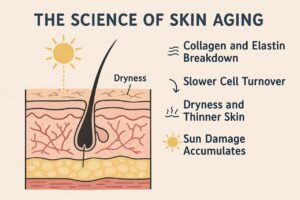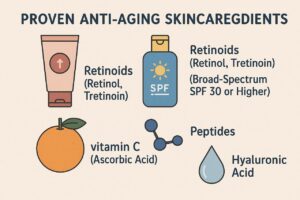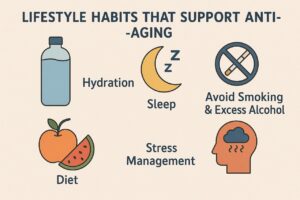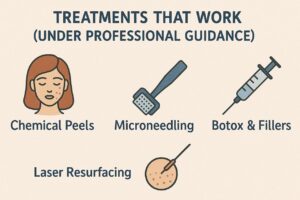Anti-Aging Skincare: What Actually Works?
Aging is a natural part of life, but that doesn’t mean we can’t age gracefully. With an ever-growing number of anti-aging products crowding the market, it’s easy to feel overwhelmed. Creams promising to erase wrinkles, serums that claim to restore youth, and trendy ingredients that seem to come and go—what actually works?
In this post, we’ll cut through the hype and take a science-backed look at the most effective anti-aging skincare strategies and ingredients.
1. The Science of Skin Aging
Before we dive into solutions, it’s important to understand what happens to our skin as we age:

• Collagen and Elastin Breakdown: These proteins provide firmness and elasticity. Their production decreases with age, leading to sagging and wrinkles.
• Slower Cell Turnover: As we get older, the skin renews itself more slowly, resulting in a duller complexion.
• Dryness and Thinner Skin: The skin loses moisture more easily and becomes thinner, making it more susceptible to damage.
• Sun Damage Accumulates: Over time, UV exposure causes photoaging—sun spots, fine lines, and a leathery texture.
Now that we know the why, let’s talk about what can actually help.
2. Proven Anti-Aging Skincare Ingredients

a. Retinoids (Retinol, Tretinoin)
Retinoids are among the most researched and effective anti-aging ingredients. Derived from Vitamin A, they work by:
• Boosting collagen production
• Increasing cell turnover
• Reducing fine lines and wrinkles
• Fading hyperpigmentation
Tip: Start with an over-the-counter retinol and work up to prescription-strength tretinoin under a dermatologist’s guidance. Expect initial irritation—this is normal.
b. Sunscreen (Broad-Spectrum SPF 30 or Higher)
If you only use one anti-aging product, let it be sunscreen. UV exposure is the #1 external factor causing premature aging:
• Prevents photoaging (sun spots, fine lines)
• Reduces risk of skin cancer
• Helps preserve collagen
Tip: Use daily—even on cloudy days or indoors (UV rays penetrate windows).
c. Vitamin C (Ascorbic Acid)
This potent antioxidant helps neutralize free radicals caused by pollution and sun exposure. It also:
• Brightens skin
• Boosts collagen
• Fades dark spots
Tip: Look for serums with 10–20% L-ascorbic acid in opaque, airtight packaging for maximum potency.
d. Peptides
Peptides are small proteins that signal your skin to produce more collagen and elastin:
• Improve firmness
• Reduce fine lines
• Enhance skin texture
Tip: Often found in moisturizers and serums; look for peptides like Matrixyl or copper peptides.
e. Hyaluronic Acid
A hydration powerhouse, hyaluronic acid (HA) draws moisture into the skin:
• Plumps fine lines temporarily
• Improves skin barrier function
• Enhances overall glow
Tip: Use on damp skin and follow with a moisturizer to lock it in.
3. Lifestyle Habits That Support Anti-Aging
Topicals can only do so much without supportive lifestyle habits. Here’s what makes a difference:

• Hydration: Drink plenty of water. Dehydrated skin looks older and duller.
• Sleep: Skin regenerates during sleep. Aim for 7–9 hours per night.
• Diet: A diet rich in antioxidants (berries, leafy greens, nuts) and omega-3s supports skin health.
• Avoid Smoking & Excess Alcohol: These accelerate skin aging by damaging collagen and reducing circulation.
• Stress Management: Chronic stress can contribute to inflammation and premature aging.
4. Treatments That Work (Under Professional Guidance)
In-office procedures can complement your skincare regimen for more dramatic results:

• Chemical Peels: Remove the outer layer of dead skin, improving tone and texture.
• Microneedling: Stimulates collagen through controlled micro-injuries.
• Laser Resurfacing: Targets wrinkles, sun damage, and uneven tone.
• Botox & Fillers: Temporarily reduce wrinkles and restore volume.
Always consult a board-certified dermatologist before starting any treatment plan.
5. What Doesn’t Work (or Has Limited Evidence)
Some popular trends and ingredients have little evidence to support their effectiveness:

• Collagen Creams: Collagen molecules are too large to penetrate skin. Instead, use ingredients that stimulate collagen production.
• Jade Rollers & Gua Sha: While relaxing, they offer limited long-term benefits beyond temporary lymphatic drainage.
• DIY Home Remedies: Natural doesn’t always mean effective—or safe. Lemon juice, for example, can irritate skin and cause photosensitivity.
Final Thoughts
When it comes to anti-aging skincare, consistency beats gimmicks. Focus on well-researched ingredients like retinoids, sunscreen, and antioxidants. Pair your skincare with healthy habits and, if needed, consult professionals for targeted treatments.
There’s no magic bullet, but with the right routine, you can maintain healthy, vibrant skin at any age.
